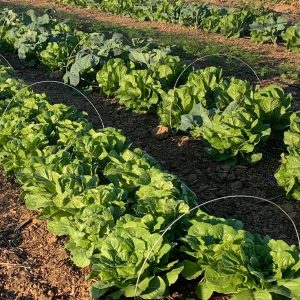
Julie Burton
Coordinator of Innovation and Farm Lab Development Farm Lab Dreams Campus
Encinitas Union School District
In the morning sun, farmer Cathryn pulls back a shade cloth to expose rows of romaine, kale, and chard in the main market garden. Strawberries, broccoli, and parsley are ready for harvest. The neighboring field’s soil is saturated after last night’s spring rain – a gift for the newly planted carrots, tomatoes, and celery that will be incorporated into school lunch offerings and salad bars at all nine elementary school sites.
In 2013, Encinitas Union School District (EUSD) became the first district in the nation to manage its own certified organic farm. In addition to transforming school lunch, EUSD’s farm-to-school efforts minimized the district’s environmental footprint, built student awareness of food systems, and increased student willingness to try new, seasonal foods.

will be harvested and served in school lunches at all nine EUSD elementary schools.
The organic farm is just one component of EUSD’s 10-acre sustainability campus, Farm Lab. In addition to growing organic produce, Farm Lab provides district wide sustainability education at the DREAMS Campus. (Design, Research, Engineering, Art, Math and Science) This innovative indoor/outdoor learning space provides 4PBL (Project, Place, Problem and Phenomena based learning) experiences to all Kindergarten through 6th grade students. Visits integrate Next Generation Science Standards, CA Environmental Principles and Concepts, and UN Sustainability Goals to build student understanding of the interconnectedness of food, wellness, sustainability, and environmental stewardship.
In the past year, thanks to our partnership with The Ecology Center www.theecologycenter.org, we have shifted from using conventional organic farming practices to a regenerative organic agriculture model. This purposeful shift has further increased the benefits of our project. We were already using organic pest control measures, and now we are actively improving the soil as we protect it. Why does this matter? Healthy soil is the foundation for a healthy planet.
The regenerative farming practices we’ve integrated include minimal tillage, use of compost and cover crops, crop rotation, intercrop planting, and integrating native gardens to increase bee and beneficial insect habitat. These practices increase soil fertility, improve water retention capabilities, promote biological diversity, and increase carbon sequestration. Yes, you read that correctly. We are literally mitigating climate change by how we are growing produce for our student lunches.
Our shift to regenerative organic agriculture enabled us to become Real Organic Project www.realorganicproject.org certified in September 2020. We are doing our part to ensure organic farming stays rooted in soil health. “One of the bestkept secrets in the world today is that the solution to global warming and the climate crisis…lies right under our feet, and at the end of our knives and forks.” – Ronnie Cummins, Regeneration International.
Want to know more about how small, regenerative agriculture farms can mitigate climate change? Watch Small Scale Farmers Cool the Planet www.youtube.com/ watch?v=GjD8URaGe88&t=973s
